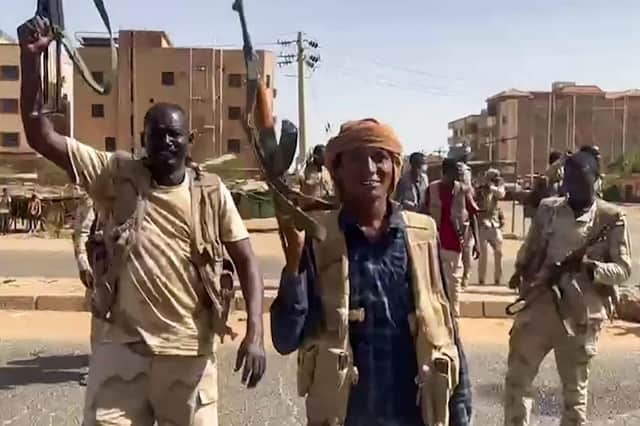Belfast Agreement @25: Thankful for the lives saved by the 1998 deal, while mindful of even greater global challenges -Canon Ian Ellis


Along with that liturgical material, drawn up with the key input of the Church of Ireland's liturgical advisory committee and Evangelical Alliance Northern Ireland, the Church Leaders' Group (comprising the two Archbishops of Armagh, the Methodist President, the Presbyterian Moderator and the President of the Irish Council of Churches) added a brief comment on the significance of the 1998 agreement.
While describing it as “a political deal designed to bring about the end of the Troubles, which after nearly thirty years of violence and conflict on the streets of Northern Ireland had resulted in more than 3,500 deaths”, they accepted that people from different parts of the community would approach the anniversary with “mixed emotions”.
Advertisement
Hide AdAdvertisement
Hide AdThey expressed thankfulness for many lives no doubt having been saved as a result of the agreement but at the same time recognised how “the relative peace that it brought came at a cost”. They referred to the early release of prisoners, with victims' families having had to show tolerance and acceptance despite the fact that loved ones would never return home.
The agreement is sometimes seen as set in stone, but no political accord is necessarily forever. Nonetheless, while revising the agreement may be needed at some stage, it would not be for the fainthearted and could be a very difficult process. Whatever the future holds as far as the 1998 deal is concerned, the church leaders were surely correct to highlight the importance of tolerance, respect for our differences and greater understanding and reconciliation.
Of course, the rest of world did not stand still on the agreement's quarter-century anniversary. There is a bigger world out there, one in which there are immense problems and tragedies on an unimaginable scale to be faced. While President Biden was visiting us, the United States was still coming to terms with the indictment of his predecessor in the White House, Donald Trump. Mr Trump voiced criticism of his successor for being here while events on the global stage were critical. The former president commented: "The world is exploding around us, you could end up in a third world war and this guy's going to be in Ireland."
Yet, now it transpires that Mr Trump is in fact himself expected in Ireland before long. No matter how much Mr Trump may seek to portray himself as the responsible one, it doesn't seem that President Biden is at all fazed by such commentary. After all, so many of the all-important floating voters simply will not be impressed by Donald Trump's recent indictment, let alone his various other legal entanglements.
Advertisement
Hide AdAdvertisement
Hide AdYet there is also another point Mr Trump has been trying to make, namely, that the chaotic end to the US-led war in Afghanistan was down to nothing less than Mr Biden's incompetence. The Biden administration had put an opposite view on the record, with a White House paper indicating that Mr Biden’s “choices for how to execute a withdrawal from Afghanistan were severely constrained by conditions created by his predecessor”. The paper went on to point out that when President Biden took office in January 2021, he “was facing President Trump’s near-term deadline to withdraw all US forces from Afghanistan by May 2021, or the Taliban would resume its attacks on US and allied troops”.
Mr Trump claimed this was a White House disinformation tactic, and former Secretary of State in the Trump administration Mike Pompeo described the claim as “outrageous” and the withdrawal operation as “botched”.
No matter how this is viewed, it is a very sad fact that while so many eyes are quite rightly focused on Ukraine, Afghanistan is also continuing to suffer in terrible ways. The churches, not least through their aid and development arms, remain particularly aware of the gravity of the tragic Afghan situation. Last year, the Daily Telegraph reported that economic desperation had led to “an increase in cases of parents deciding to sell children into marriage, or people selling kidneys in the black market organ transplant trade”.
Christian Aid's Afghanistan manager, Subrata De, said: “This kind of poverty is something unbelievable and indescribable.”
Advertisement
Hide AdAdvertisement
Hide AdAlso last year, Christian Aid was among the many charities across the world that helped people in the wake of earthquakes that only added to people's misery and grief. Now, the Taliban's discriminatory and oppressive treatment of women has once again come to the fore with the UN in Afghanistan reiterating its unequivocal condemnation of a decision by the Taliban de facto authorities to ban Afghan women from working for the UN in Afghanistan”.
Last December, Christian Aid deplored the announcement of a ban on NGOs employing women in Afghanistan.
It is when one considers such extreme circumstances, or the brutality facing the people of Ukraine, and now Sudan, as well as other countries at war or facing extreme poverty, that the concerns of those of us who live in this part of the world are put into a certain perspective.
• Canon Ian Ellis is a former editor of The Church of Ireland Gazette